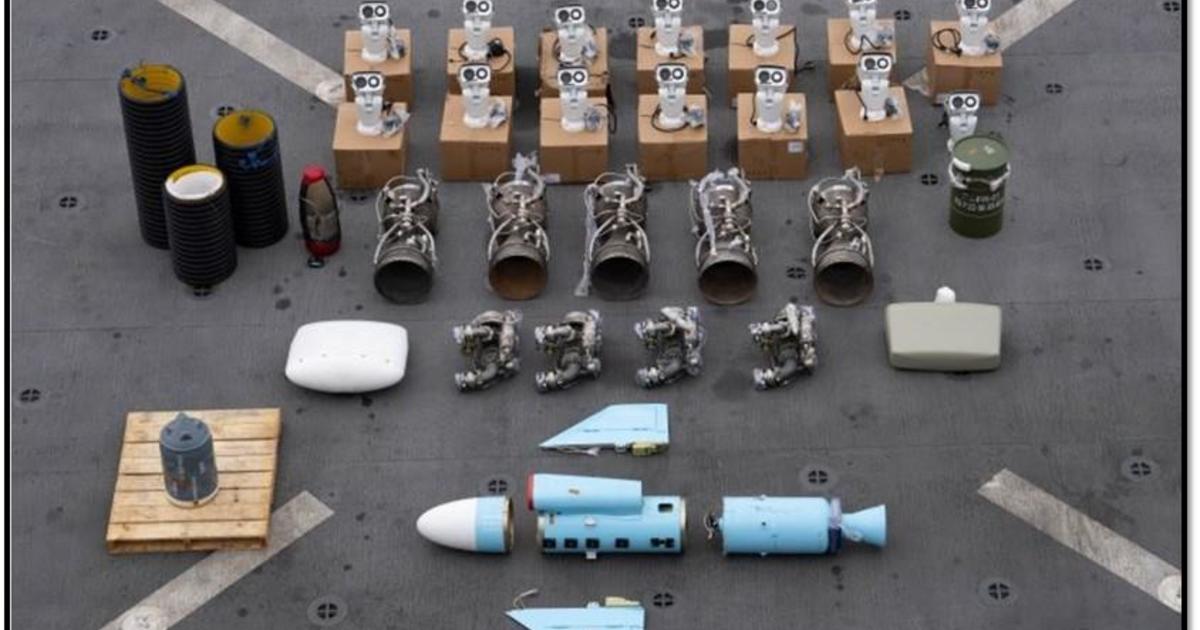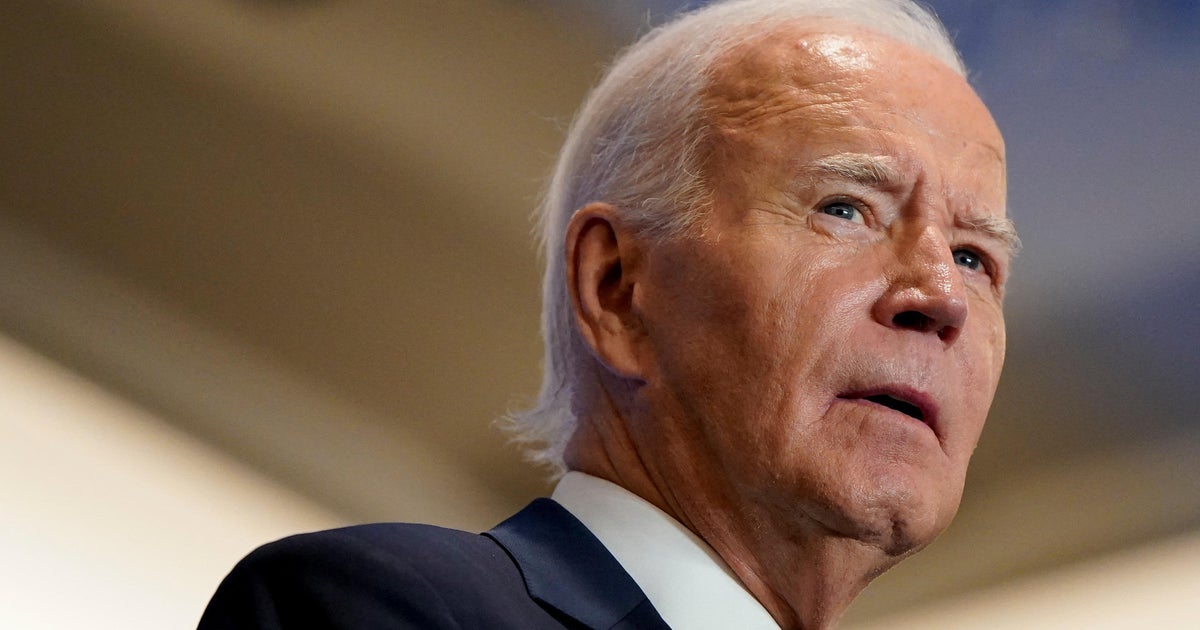CBS News
U.S. says 2 SEALs lost seizing Iran weapons shipment for Houthis, as Qatar urges focus on Israel-Hamas war

The U.S. military said Tuesday that it had seized a boatload of “advanced conventional weapons” sent from Iran to the Houthi rebels in Yemen — evidence, according to the U.S. Central Command’s Gen. Michael Erik Kurilla, that “Iran continues shipment of advanced lethal aid to the Houthis” as they attack commercial vessels in the Red Sea.
“Two U.S. Navy SEALs previously reported as lost at sea were directly involved in this operation,” Kurilla, CENTCOM’s commander, said in the statement, adding that an “exhaustive search” continued for the elite troops who had not been seen since the Jan. 11 seizure of the Iranian boat.
Defense officials told CBS News over the weekend that the missing sailors went overboard while attempting to board the Iranian vessel that was found to be carrying arms from Iran to Yemen. The boarding was carried out in rough seas, the officials said.
A U.S. official told CBS News on Tuesday that the more strikes were carried out overnight against Houthi targets in the large portion of Yemen controlled by the Iran-backed rebels. The official did not provide any further detail, but previous strikes — launched Friday in conjunction with the U.K. and other allies — have targeted Houthi missile and drone storage and launch facilities and other military infrastructure, according to the Pentagon and U.K. Ministry of Defense.
Houthi attacks on Red Sea shipping continue
Despite the ongoing strikes against the Houthis and loss of two U.S. troops in what CENTCOM called the “first seizure of lethal, Iranian-supplied advanced conventional weapons to the Houthis since the beginning of” the group’s attacks on merchant vessels in November, those attacks have continued in the vital shipping lanes of the Middle East.
The Houthis have vowed to keep attacking ships they deem connected to Israel or its international allies, justifying the missile and drone launches as retaliation for the ongoing Israeli military operation in Gaza against the Iran-backed Palestinian militant group Hamas.
On Monday, a missile struck a U.S.-owned commercial vessel in the Red Sea, causing a fire in a cargo hold but no serious damage or casualties.
The U.K. military’s Maritime Trade Operations agency said Tuesday that it had “received a report of an incident” west of Houthi-held Yemen, as the private British maritime safety firm Ambrey said a Malta-flagged cargo ship had been “targeted and impacted with a missile while transiting the southern Red Sea.”
Ambrey was quoted by the AFP news agency as saying the ship had docked in Israel since the start of the Gaza war and was headed to the Suez Canal, but changed course to return to port after the attack.
Qatar warns against “focusing on the symptoms”
The prime minister of Qatar, which has served as a valuable intermediary for the U.S. and Israel in negotiations with Hamas throughout the Gaza war, suggested Tuesday that the efforts of the U.S. and its allies against the Houthis could prove futile, saying the Yemeni rebels’ actions were rooted in the ongoing Gaza war, and military action alone “will not contain” them.
Speaking at the World Economic Forum’s annual gathering in Davos, Switzerland, Prime Minister Sheikh Mohammed bin Abdulrahman Al Thani said concentrating on the Houthis’ attacks on shipping was “focusing on the symptoms and not treating the real issue,” which he said was Israel’s war with Hamas.
“We should focus on the main conflict in Gaza and, as soon as it’s defused, I believe everything else will be defused,” said the Qatari premier, urging a two-state solution with an independent state created for the Palestinians alongside Israel, to end the conflict. President Biden has continued to push for negotiations on the long-elusive two-state solution, as has been U.S. policy for decades, but the current Israeli government of Prime Minister Benjamin Netanyahu is against such talks.
DENIS BALIBOUSE/REUTERS
“What we have right now in the region is a recipe of escalation everywhere,” al Thani warned, hinting at the threat of the ongoing war in Gaza escalating or manifesting in violence across the wider Middle East.
CBS News’ David Martin and Eleanor Watson in Washington contributed to this report.
CBS News
The Menendez Brothers’ Fight for Freedom

Watch CBS News
Be the first to know
Get browser notifications for breaking news, live events, and exclusive reporting.
CBS News
9/28: CBS Weekend News – CBS News

Watch CBS News
Be the first to know
Get browser notifications for breaking news, live events, and exclusive reporting.
CBS News
California Gov. Gavin Newsom vetoes bill requiring speeding alerts in new cars

California Gov. Gavin Newsom vetoed a bill Saturday that would have required new cars to beep at drivers if they exceed the speed limit in an effort to reduce traffic deaths.
California would have become the first to require such systems for all new cars, trucks and buses sold in the state starting in 2030. The bill would have mandated that vehicles beep at drivers when they exceed the speed limit by at least 10 mph.
The European Union has passed similar legislation to encourage drivers to slow down. California’s proposal would have provided exceptions for emergency vehicles, motorcycles and motorized scooters.
In explaining his veto, Newsom said federal law already dictates vehicle safety standards and adding California-specific requirements would create a patchwork of regulations.
The National Highway Traffic Safety “is also actively evaluating intelligent speed assistance systems, and imposing state-level mandates at this time risks disrupting these ongoing federal assessments,” the Democratic governor said.
Opponents, including automotive groups and the state Chamber of Commerce, said such regulations should be decided by the federal government, which earlier this year established new requirements for automatic emergency braking to curb traffic deaths. Republican lawmakers also said the proposal could make cars more expensive and distract drivers.
The legislation would have likely impacted all new car sales in the U.S., since the California market is so large that car manufacturers would likely just make all of their vehicles comply.
California often throws that weight around to influence national and even international policy. The state has set its own emission standards for cars for decades, rules that more than a dozen other states have also adopted. And when California announced it would eventually ban the sale of new gas-powered cars, major automakers soon followed with their own announcement to phase out fossil-fuel vehicles.
Democratic state Sen. Scott Wiener, who sponsored the bill, called the veto disappointing and a setback for street safety.
“California should have led on this crisis as Wisconsin did in passing the first seatbelt mandate in 1961,” Wiener said in a statement. “Instead, this veto resigns Californians to a completely unnecessary risk of fatality.”
The speeding alert technology, known as intelligent speed assistance, uses GPS to compare a vehicle’s pace with a dataset of posted limits. If the car is at least 10 mph over, the system emits a single, brief, visual and audio alert.
The proposal would have required the state to maintain a list of posted speed limits, and it’s likely that those would not include local roads or recent changes in speed limits, resulting in conflicts.
The technology has been used in the U.S. and Europe for years. Starting in July, the European Union will require all new cars to have the technology, although drivers would be able to turn it off. At least 18 manufacturers including Ford, BMW, Mercedes-Benz and Nissan, have already offered some form of speed limiters on some models sold in America, according to the National Transportation Safety Board.
The National Highway and Traffic Safety Administration estimates that 10% of all car crashes reported to police in 2021 were related to speeding. This was especially a problem in California, where 35% of traffic fatalities were speeding-related — the second highest in the country, according to a legislative analysis of the proposal.
Last year the NTSB recommended federal regulators require all new cars to alert drivers when they speed. Their recommendation came after a crash in January 2022, when a man with a history of speeding violations ran a red light at more than 100 mph and struck a minivan, killing himself and eight other people.










